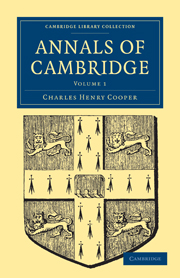Book contents
- Frontmatter
- Contents
- FABULOUS HISTORY
- THE BRITONS AND ROMANS
- THE SAXONS AND DANES
- WILLIAM THE CONQUEROR
- WILLIAM RUFUS
- HENRY THE FIRST
- STEPHEN
- HENRY THE SECOND
- RICHARD THE FIRST
- JOHN
- HENRY THE THIRD
- EDWARD THE FIRST
- EDWARD THE SECOND
- EDWARD THE THIRD
- RICHARD THE SECOND
- HENRY THE FOURTH
- HENRY THE FIFTH
- HENRY THE SIXTH
- EDWARD THE FOURTH
- HENRY THE SIXTH RESTORED
- EDWARD THE FOURTH RESTORED
- EDWARD THE FIFTH
- RICHARD THE THIRD
- HENRY THE SEVENTH
- HENRY THE EIGHTH
RICHARD THE SECOND
Published online by Cambridge University Press: 29 August 2010
- Frontmatter
- Contents
- FABULOUS HISTORY
- THE BRITONS AND ROMANS
- THE SAXONS AND DANES
- WILLIAM THE CONQUEROR
- WILLIAM RUFUS
- HENRY THE FIRST
- STEPHEN
- HENRY THE SECOND
- RICHARD THE FIRST
- JOHN
- HENRY THE THIRD
- EDWARD THE FIRST
- EDWARD THE SECOND
- EDWARD THE THIRD
- RICHARD THE SECOND
- HENRY THE FOURTH
- HENRY THE FIFTH
- HENRY THE SIXTH
- EDWARD THE FOURTH
- HENRY THE SIXTH RESTORED
- EDWARD THE FOURTH RESTORED
- EDWARD THE FIFTH
- RICHARD THE THIRD
- HENRY THE SEVENTH
- HENRY THE EIGHTH
Summary
1377.
This year the Chancellor and Scholars presented a petition to Parliament for correction of certain defects in their charters.
The nation being at this period exposed to great danger from the French, who were on the coast of England with a fleet, Thomas Arundel, Bishop of Ely, on the 22nd of September, addressed letters to the Chancellor and University, imploring them by masses, processions, and litanies, to supplicate for the peace and tranquillity of the King, the Realm, and the Church.
In pursuance of a Parliamentary grant, the King's writ was on the 20th of November directed to the mayors, bailiffs and good men of the towns of Cambridge and Huntingdon, requiring the richer persons of those towns to provide a ballinger or small barge with from forty to fifty oars, for defence of the realm; two-thirds of the expence to be defrayed by Cambridge, and the residue by Huntingdon. By another writ tested the 30th of January, all persons having chattels to the value of ten marks, were to be rated towards the expence of furnishing this barge.
On the 8th of December, the King, by a charter of inspeximus, confirmed the principal charters granted to the burgesses by his predecessors.
1377–8
On the 20th of March, the King issued a writ to the sheriff revoking a former writ exonerating the Chancellor and Scholars, from tenths and fifteenths in respect of their tenements, possessions, and books.
- Type
- Chapter
- Information
- Annals of Cambridge , pp. 116 - 144Publisher: Cambridge University PressPrint publication year: 2009First published in: 1845



